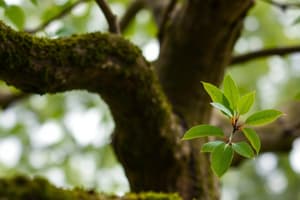Podcast
Questions and Answers
Which of the following scientific disciplines would be most directly involved in studying the formation of new stars within a nebula?
Which of the following scientific disciplines would be most directly involved in studying the formation of new stars within a nebula?
Which of the following best describes the difference between a scientific law and a scientific theory?
Which of the following best describes the difference between a scientific law and a scientific theory?
A scientist observes that a particular species of plant thrives in acidic soil. She hypothesizes that the plant's growth is directly proportional to the soil's acidity. What should be her next step in the scientific method?
A scientist observes that a particular species of plant thrives in acidic soil. She hypothesizes that the plant's growth is directly proportional to the soil's acidity. What should be her next step in the scientific method?
Which of the following is NOT a critical characteristic of a strong scientific theory?
Which of the following is NOT a critical characteristic of a strong scientific theory?
Signup and view all the answers
Which of the following best exemplifies the cyclical nature of the scientific method?
Which of the following best exemplifies the cyclical nature of the scientific method?
Signup and view all the answers
Which of the following is an example of a scientific law?
Which of the following is an example of a scientific law?
Signup and view all the answers
A scientist is studying the effects of different fertilizers on plant growth. Which of the following would be the most important aspect of her experimental design to ensure reliable results?
A scientist is studying the effects of different fertilizers on plant growth. Which of the following would be the most important aspect of her experimental design to ensure reliable results?
Signup and view all the answers
Why is accurate measurement essential in scientific inquiry?
Why is accurate measurement essential in scientific inquiry?
Signup and view all the answers
Which of the following statements best describes the role of skepticism in scientific inquiry?
Which of the following statements best describes the role of skepticism in scientific inquiry?
Signup and view all the answers
Which of the following examples best illustrates the concept of scientific inquiry?
Which of the following examples best illustrates the concept of scientific inquiry?
Signup and view all the answers
Flashcards
Scientific Method
Scientific Method
A systematic approach involving observation, hypothesis, experimentation, data analysis, and conclusion.
Observation
Observation
The initial step in the scientific method where data is gathered through the senses.
Hypothesis
Hypothesis
A testable prediction or explanation for an observed phenomenon.
Experimentation
Experimentation
Signup and view all the flashcards
Data Analysis
Data Analysis
Signup and view all the flashcards
Conclusion
Conclusion
Signup and view all the flashcards
Scientific Theory
Scientific Theory
Signup and view all the flashcards
Scientific Law
Scientific Law
Signup and view all the flashcards
Scientific Inquiry
Scientific Inquiry
Signup and view all the flashcards
Scientific Measurement
Scientific Measurement
Signup and view all the flashcards
Study Notes
Scientific Method
- Science is a systematic approach to understanding the natural world.
- It involves observation, hypothesis formation, experimentation, data analysis, and conclusion drawing.
- The scientific method is a cyclical process, with results often leading to new questions.
- Key components of the method include observation, forming a testable hypothesis, designing experiments, collecting data, analyzing and interpreting data, drawing conclusions, and communicating findings.
Branches of Science
- Science is broadly categorized into several disciplines.
- Physical science: Studies non-living matter and energy.
- Physics: Deals with fundamental concepts like motion, energy, force, and matter.
- Chemistry: Focuses on matter's composition, structure, properties, and reactions.
- Astronomy: Studies celestial objects, the universe, and cosmic phenomena.
- Earth science: Explores Earth's structure, processes, and history.
- Geology: Focuses on Earth's composition, structure, and processes.
- Oceanography: Explores oceans, their properties, and marine life.
- Meteorology: Studies the atmosphere, weather patterns, and climate.
- Biological science: Examines living organisms and their interactions.
- Biology: Studies living organisms and their interactions with the environment.
- Botany: Focuses on plants.
- Zoology: Focuses on animals.
- Physical science: Studies non-living matter and energy.
Scientific Theories and Laws
- Scientific theories are well-substantiated explanations of aspects of the natural world.
- They can incorporate facts, laws, inferences, and tested hypotheses.
- Scientific theories are continually refined and updated with new evidence.
- Scientific laws describe predictable relationships or patterns in nature, using measurable quantities.
Scientific Inquiry
- Scientific inquiry is a process of investigation that challenges existing understanding to encourage new concepts and theories.
- It involves creativity, curiosity, and skepticism.
- Scientists must be rigorous in their investigation processes to minimize bias.
Scientific Measurement
- Accurate measurement is essential in science.
- Measurements rely on accepted scales or standards.
- Units of measure are standardized to enable consistent comparisons and communication.
Scientific Models
- Models are simplified representations of complex phenomena.
- Models can be physical, mathematical, or conceptual.
- Models aid in understanding complex systems by focusing on key components and relationships.
Scientific Ethics
- Ethical considerations are crucial in scientific research.
- Researchers must maintain honesty, integrity, and objectivity.
- This includes avoiding plagiarism, citing sources appropriately, and ensuring the safety of participants.
- Data and materials must be treated ethically.
Studying That Suits You
Use AI to generate personalized quizzes and flashcards to suit your learning preferences.
Description
This quiz explores the scientific method and its key components, including observation, hypothesis formation, experimentation, and conclusion drawing. It also covers the various branches of science, such as physical science, earth science, and their sub-disciplines. Test your knowledge of how science systematically explains the natural world.




